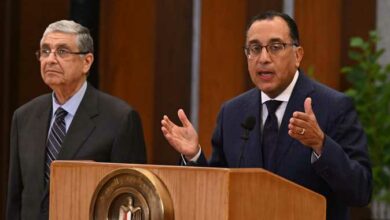Clashes between policemen and protesters on 28 June were a reminder of the lingering tensions between the security apparatus and citizens. There are different visions for how this relationship can be fixed.
"The gap between the people and the police will not be fixed all of a sudden. It will take time," said Brigadier General Hany Abdel Lateef, vice president of the Interior Ministry's Public Relations Department.
Abdel Lateef believes that the performance of the security apparatus now is better than before the revolution, but, he said, the Interior Ministry still has plans for reform.
A change in strategy has been enforced within the ranks of the ministry, he says. The main charge against the police, one that helped spark the 25 January revolution, is they don’t serve the people.
"The ministry’s priority now is securing the citizens, not the regime, as it used to be before the revolution," Abdel Lateef said.
"People may have seen it for themselves. For instance, officials’ security protection has been abolished on orders of Mansour al-Essawy, the interior minister," he said, claiming the minister told them, "If I am afraid myself, I won't be able to protect citizens."
The ministry has also issued two booklets for free distribution to citizens, Abdel Lateef said. One lists citizens' rights when dealing with police, and the other is a guide to the services provided by the ministry.
"In each police station or institution, there is a big banner that guides people, instead of them having to deal with employees at every step, all the time," he said.
If any citizen has a problem, he said, the ministry's public relations department will receive all complaints and urges people not to waive their rights.
But Lieutenant Colonel Ahmed Mashaly of the General Coalition of Police Officers, a group hoping to emphasize the role of police and improve their relations with people, is less optimistic. For him, the changes are only cosmetic.
"Slogans don't mean anything," he said, accusing the interim Interior Ministry of following “the same old policies."
The security response to protesters – who were demanding justice for the families of those who died in the revolution – on 28 June in Tahrir Square, using tear gas and reported insults, raised the flags of alert for Essawy and the cabinet. Many demanded their resignation.
Mashaly said the only new instruction policemen have recieved is to smile while dealing with people. Beyond smiling, little has changed.
For many, the full return of police to the streets remains the way of improving their relationship with the people. Since the police withdrew from the streets on 28 January in what was believed to be a Mubarak regime plot to create chaos and sabotage the revolution, there hasn’t been a proper comeback, observers say.
"Police forces exist in large numbers and have been arresting many thugs," Mashaly said, but qualifies this by saying that they are not present in the locations where people need them.
For Mashaly, a host of measures could be taken to improve the relationship between people and police, from changing uniforms, using technology to improve efficiency, purifying the apparatus from corrupted personnel and increasing wages drastically. He thinks policemen who take bribes should be sentenced to prison.
But human rights activists do not agree on raising policemen’s payments. According to Gamal Eid of the Arab Network for Human Rights Information, such a raise would be unfair if there isn’t a general increase of the national minimum wage.
The cost of police are estimated at LE14 billion, which amounted for 3.5 percent of the 2010-2011 state budget.
In its draft for the 2011-2012 state budget, the Finance Ministry allocated LE25.5 billion for defense and national security.
Mashaly also demanded providing policemen with judicial immunity while working and dealing with thugs. If an officer feels he could be legally harmed while performing his duty and combatting crime, he will refuse to work, said Mashaly.
"The word judicial immunity is totally rejected. The law should be the sovereign," said Eid.
To reform the relationship between people and the police, according to Eid, the Ministry should establish a dialogue with civil society. But ahead of the rebuilding process, justice should be pursued against policemen who have committed criminal offenses, including killing and injuring protesters during the revolution, he concluded.




